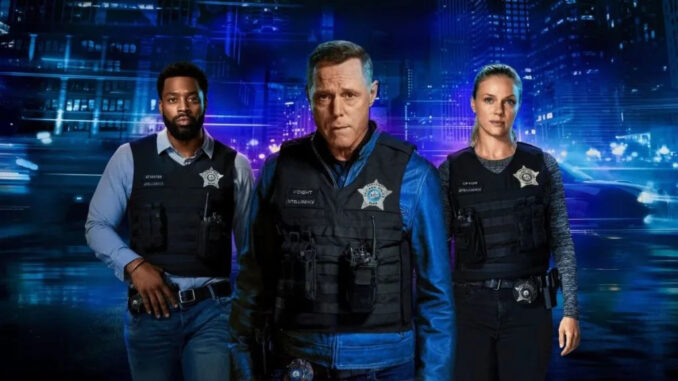
The Perpetual Motion of Intelligence: Chicago P.D.'s 2025 Cast Shake-Up and the Art of Evolution
The hum of the television set, the iconic siren wail, and the familiar, often grim, faces of the Chicago Police Department’s Intelligence Unit have anchored viewers for over a decade. Chicago P.D., a cornerstone of Dick Wolf’s "One Chicago" universe, thrives on its gritty realism, complex moral dilemmas, and, crucially, the deeply etched personalities of its cast. As the calendar pages turn towards 2025, the perennial question arises, a narrative tightrope walk as old as long-running dramas themselves: Who’s leaving, who’s returning, and how will these shifts redefine the very soul of the 21st District? While precise announcements remain in the speculative ether, an illustrative essay can explore the patterns, pressures, and narrative mechanics that fuel such cast shake-ups, demonstrating how these movements are not merely exits and entrances, but the very pulse of the show's enduring appeal.
The departure of a beloved character from a long-running series is a seismic event for any fanbase, often met with a cocktail of grief, anger, and fervent speculation. Chicago P.D. is no stranger to such shifts, having navigated significant goodbyes throughout its tenure. The ghost of Detective Erin Lindsay (Sophia Bush), the tragic loss of Detective Alvin Olinsky (Elias Koteas), and the more recent farewells of characters like Antonio Dawson (Jon Seda) illustrate a fundamental truth: no character, save perhaps the indomitable Hank Voight himself, is truly impervious to change. Actors pursue new opportunities, creative directions diverge, and character arcs naturally conclude. For 2025, we might anticipate that some actors, after years immersed in the intensity of Intelligence, could seek fresh challenges, or their characters might reach a narrative crossroads – a promotion, a transfer, even a decision to leave the force for personal peace.
Consider the narrative implications of a potential departure. If a long-standing member of the unit were to exit, it wouldn't just be an actor leaving; it would be a gaping hole in the intricate web of relationships that define the team. Take, for example, the imminent departure of Tracy Spiridakos as Hailey Upton. This exit, unfolding in 2024, sets a powerful precedent for the questions that will undoubtedly plague the build-up to 2025. Upton’s character, with her troubled past, fierce loyalty, and complex relationship with Halstead (Jesse Lee Soffer, another significant departure), has been a central pillar. Her absence creates a void, a narrative opportunity that the show’s writers will undoubtedly fill. Who will step into that space, both emotionally and professionally? Will it lead to another character, perhaps one currently in a supporting role, stepping up to fill the vacuum, or will it necessitate the introduction of a completely new face?
Conversely, the idea of "who’s returning" in 2025 carries its own unique intrigue. While a permanent return of a main character is rare in Chicago P.D.'s history, the possibility of a guest appearance, a fleeting cameo that ties up loose ends or provides crucial support in a crisis, is always on the table. Fans constantly clamor for the return of favorite faces, even for an episode, highlighting the deep emotional investment forged over seasons. More broadly, "returning" can also refer to the steadfast presence of core characters who form the show's bedrock. Jason Beghe’s Hank Voight, for instance, is the show’s unwavering anchor, a character whose moral compass is perpetually spinning but always points towards a brutal, effective form of justice. The steady presence of characters like Kevin Atwater (LaRoyce Hawkins), Kim Burgess (Marina Squerciati), and Adam Ruzek (Patrick John Flueger) provides continuity and a sense of family that anchors the more tumultuous shifts. Their "return" each season is not just a contractual obligation, but a reaffirmation of the show's identity.
The illustrative nature of these potential shake-ups lies in how they serve the storytelling. A new character isn't just a replacement; they are a fresh perspective, a new set of eyes to challenge Voight's methods, a different background to introduce new social dynamics, or a personal story that can intertwine with existing narratives. They force the established unit to adapt, to question, and often, to grow. A departure, while painful, can catalyze intense character development for those left behind – grief, guilt, responsibility, or a renewed sense of purpose can all stem from the absence of a colleague. The cast shake-up, therefore, is not a flaw in the show's fabric, but a dynamic thread in its ongoing tapestry, providing opportunities for fresh conflicts, character evolution, and renewed narrative energy.
As 2025 dawns, the precise lineup of the Intelligence Unit remains to be seen. What is certain, however, is that Chicago P.D. will continue its symbiotic dance between continuity and evolution. The whispers of departures and the anticipation of new arrivals are not just fan fodder; they are integral to the show's longevity. They keep the narrative fresh, the stakes high, and the emotional core of the series vibrant. In the ever-changing landscape of television, Chicago P.D. has mastered the art of reinvention, proving that the heart of Intelligence beats strongest not despite its cast shake-ups, but often, because of them.
